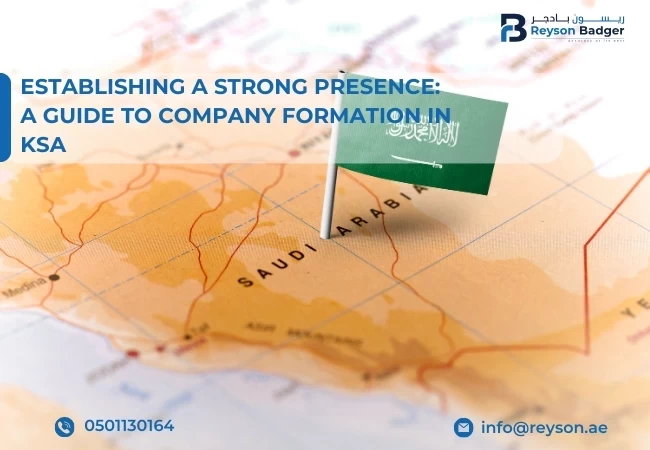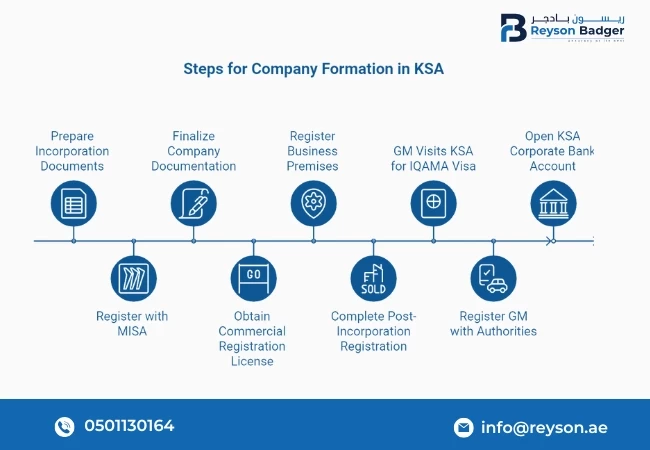Establishing a Strong Presence: A Guide to Company Formation in KSA
Written By Akshaya Ashok, Reviewed By Reyees K P
Published on 19/12/2024

Saudi Arabia is on a developmental journey, guided by Vision 2030. This goal-oriented plan is to widen the economy and create a strong business community. Company formation presents exciting opportunities across key sectors like tourism, renewable energy, and technology.
This blog will guide you through the Saudi company formation process, exploring different legal entities, outlining the benefits of doing business in KSA, and providing a step-by-step guide for company formation in Saudi Arabia. By understanding the KSA market and navigating the legal landscape, you can unlock significant growth potential and contribute to the Kingdom's economic success.
What Opportunities Exist in the KSA Market for Businesses and Investors?
Saudi Arabia is undergoing a remarkable transformation, driven by Vision 2030, a national plan aimed at diversifying the economy beyond oil dependence and fostering a thriving private sector. This "deep dive" will explore key sectors, highlighting opportunities and considerations for businesses looking to register a company in Saudi Arabia and companies set up in Saudi Arabia.
1. Tourism:
Opportunities:
- Niche Tourism: Explore untapped segments like eco-tourism, cultural tourism, and religious tourism.
- Infrastructure Development: Leverage government initiatives supporting new airports, luxury resorts, and entertainment complexes.
- Skilled Workforce: Tap into the growing pool of professionals in the hospitality and tourism sectors.
2. Renewable Energy:
Opportunities:
- Solar & Wind Power: Focus on residential, commercial, and large-scale solar and wind energy projects.
- Energy Storage Solutions: Explore opportunities in battery technology and other energy storage solutions.
- Government Incentives: Benefit from subsidies, tax breaks, and preferential access to land for renewable energy projects.
3. Technology:
Opportunities:
- Recent developments include artificial intelligence (AI), Internet of Things, cybersecurity, and fintech.
- Government Support: Leverage government initiatives fostering innovation and attracting tech talent.
- Skilled Workforce: Tap into the growing pool of tech-savvy graduates and collaborate with local universities.
4. Healthcare:
Opportunities:
- Specialized Services: Focus on telemedicine, personalized medicine, and preventative healthcare.
- Infrastructure Development: Leverage government initiatives to improve hospitals and clinics.
- Skilled Workforce: Collaborate with local healthcare institutions to attract and retain skilled medical professionals.
To know how to register a company in Saudi Arabia, click here
What are the Key Considerations for all Sectors in KSA?
- Market Research: Conduct thorough research to understand cultural nuances, consumer preferences, and competitive landscapes.
- Partnerships: Build relationships with local businesses to navigate the market and overcome cultural hurdles during company setup in Saudi Arabia.
- Digital Marketing: Utilize social media and digital marketing strategies to reach the tech-savvy Saudi population.
- Cultural Adaptation: Adapt products and services to local preferences and cultural sensitivities.
- Building Trust: Establish trust and long-term relationships with customers and partners.
By carefully considering these factors and aligning business strategies with Vision 2030's goals, companies can successfully navigate the KSA market and contribute to the Kingdom's economic transformation.
What are the Steps for Company Formation in KSA?

The following are the major steps:
- Prepare the necessary documents required for incorporation
- Register with the Ministry of Investment, Saudi Arabia (MISA)
- Finalize the company's legal documentation process, known as the articles of association
- Obtain the Commercial Registration (CR) license for your company
- Select the business premises and register the national address
- Complete the post-incorporation registration
- The next step is the visit of your General Manager (GM) to KSA to complete the residency visa (IQAMA) process
- Register your GM with the Government authorities and on your company books
- Apply and open a corporate bank account in KSA
What are the Legal Entities for Company Formation in Saudi?
1. Limited Liability Company (LLC)
- Structure: The most common legal entity for foreign investors is the Limited Liability Company(LLC). It can be established by a single shareholder or multiple shareholders (up to 50). Shareholders have limited liability, meaning their assets are generally not at risk for company debts
- Key Features: Flexible structure, relatively easy to establish and manage.Suitable for a wide range of business activities.
2. Joint Stock Company (JSC)
- Structure: A JSC is a publicly traded company with shares that can be traded on a stock exchange. Requires a minimum of two shareholders.
- Key Features: Access to capital through public share offerings. Suitable for large-scale businesses and those seeking significant investment.
3. General Partnership
- Structure: A partnership where all partners share in the profits and losses of the business and are jointly liable for the company's debts.
- Key Features: Simpler to establish than other entities. Suitable for smaller businesses with a few partners.
5. Technical and Scientific Services Office
- Structure: A specialized entity for companies providing technical or scientific services.
- Key Features: Allows foreign companies to provide specialized services within Saudi Arabia.
6. Regional Headquarters (RHQ)
- Structure: A regional office for a multinational company that oversees operations in multiple countries within the region.
- Key Features: Facilitates regional management and coordination for multinational companies.
7. The Establishment
- Structure: A simpler form of business entity, often used for sole proprietorships or small businesses with limited scope.
- Key Features: Easier to establish and manage than other entities. Suitable for small-scale businesses with limited complexity.
It is crucial to consult with legal and financial professionals for specific advice on the most suitable legal entity for your business in Saudi Arabia.
What are the Benefits of Company formation in KSA?
Tax Benefits:
- Company formations in Saudi Arabia can benefit from competitive tax rates and various incentives.
- These may include tax exemptions for certain sectors, no corporate tax, and incentives for research and development.
Welcoming Environment:
- The Saudi Arabian government is actively promoting a company set up in Saudi Arabia through initiatives like Vision 2030.
- This creates a more business-friendly environment with streamlined regulations and increased support for foreign investors.
Innovation:
- Saudi Arabia is fostering a culture of innovation through initiatives like NEOM, a futuristic smart city project.
- This creates opportunities for businesses to leverage cutting-edge technologies and develop innovative solutions.
Broad Economy:
- With a diverse and growing economy, Saudi Arabia offers a large and expanding market for businesses to tap into.
- This includes opportunities in sectors such as tourism, renewable energy, technology, and healthcare.
Safety, Security, and Standard of Living:
- Saudi Arabia boasts a high level of safety and security, providing a stable and secure environment for businesses to operate.
- The country also offers a high standard of living with excellent infrastructure and modern amenities.
Conclusion
It explores key sectors like tourism, renewable energy, and technology, highlighting their growth potential. This blog guides you through the company formation process in Saudi Arabia, covering legal entities like LLCs and JSCs, and outlining the benefits of doing business in KSA, including tax incentives and a welcoming environment. Key considerations for success include market research, building local partnerships, and adapting to cultural nuances. Choose Reyson Badger for expert services for company formation.
FAQs
What are the costs involved in setting up a company in KSA?
It involves various costs, including government fees, legal and professional fees, and initial capital requirements.
What documents are needed for company formation in KSA?
Key documents include passport copies, visa applications, company bylaws, and a feasibility study.
How long does it take to register a company in KSA?
The time to register a company in KSA can vary depending on the following:
- Factors: The Complexity of the business structure, completeness of documentation, and efficiency of government agencies all play a role.
- Typical Range: It generally takes a few weeks to several months to complete the registration process.

Written By
Akshaya Ashok
Akshaya Ashok is a content writer specializing in creating content focused on accounting and auditing. With over two years of experience, she has developed expertise in crafting professional content for the financial sector.


